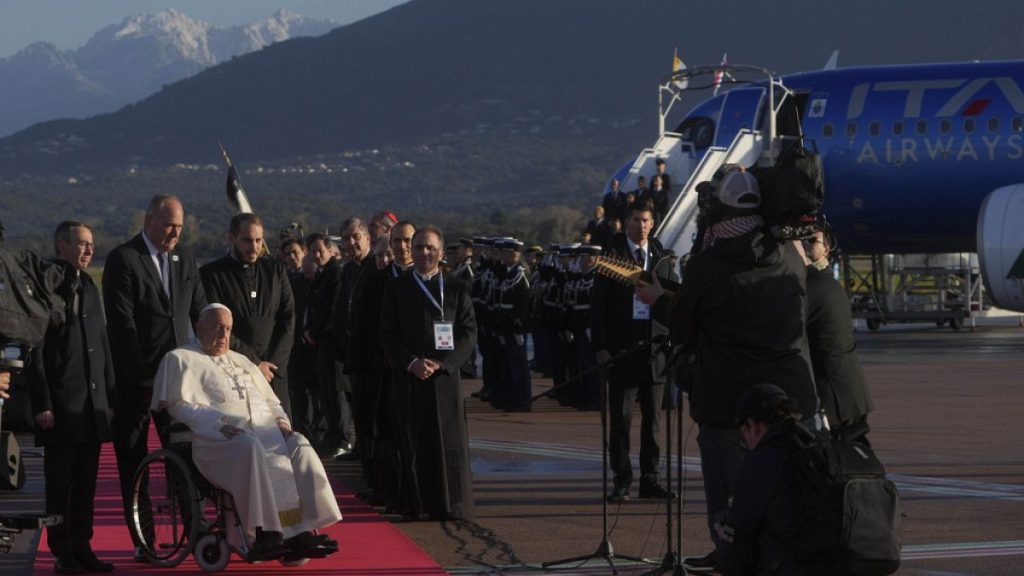Pope Francis embarked on a brief but symbolic pastoral visit to the French island of Corsica on Sunday, September 25, 2023, prioritizing a focus on the plight of migrants in the Mediterranean and the importance of local religious traditions over the grandeur of the recently reopened Notre Dame Cathedral in Paris. This nine-hour trip, one of the shortest of his papacy outside of Italy, underscored the Pope’s commitment to the “church of the peripheries” and his ongoing concern for the humanitarian crisis unfolding in the Mediterranean Sea. The visit also marked the first time a Pope has set foot on Corsican soil, an island with a rich history and complex relationship with mainland France.
The central event of the Pope’s visit was his address to over 400 participants at the Conference on Popular Religiosity in the Mediterranean, held in Ajaccio, the island’s capital and birthplace of Napoleon Bonaparte. This conference provided a platform for the Pope to engage with the deeply rooted religious traditions of Corsica, particularly the veneration of the Virgin Mary, known locally as the Madonuccia, credited with protecting the island from the plague in 1656. The Pope’s presence at this conference signified his recognition of the importance of local expressions of faith and the role of popular piety in the lives of ordinary people. By choosing Corsica as the venue for this conference, he highlighted the Mediterranean as a crossroads of cultures and faiths, and a region grappling with contemporary challenges.
Beyond the conference, the Pope’s itinerary encompassed several significant engagements. He visited the 17th-century Cathedral of Santa Maria Assunta to meet with local clergy, pausing to pay respects at the statue of the Madonuccia. Following this, he celebrated Mass at Place d’Austerlitz, a park where Napoleon is said to have played as a child, drawing an estimated 7,000 faithful. These events provided opportunities for the Pope to connect directly with the Corsican community, offering spiritual guidance and demonstrating his solidarity with the island’s inhabitants. Before his departure, a brief meeting with French President Emmanuel Macron at the airport further underscored the diplomatic dimensions of the visit.
The Pope’s decision to visit Corsica, a location closer to the Italian mainland than to Paris, and his pointed avoidance of the Notre Dame reopening ceremony earlier in the month, speaks volumes about his pastoral priorities. While the restoration of the iconic cathedral represented a triumph of human resilience and architectural achievement, the Pope’s focus remained firmly on the ongoing human tragedy unfolding in the Mediterranean. He has repeatedly referred to the sea as “Europe’s largest cemetery,” drawing attention to the thousands of migrants who have perished while attempting to reach European shores. By choosing Corsica, an island situated in the heart of the Mediterranean migration route, he sent a powerful message about the urgency of addressing this humanitarian crisis and the need for greater compassion and solidarity with those fleeing conflict and poverty.
This visit was not simply a religious pilgrimage; it was a strategic pastoral act imbued with political and social significance. Corsica’s unique history as a territory with a strong sense of identity, having been ceded to France by Genoa in 1768, and its ongoing struggle for greater autonomy, further contextualized the Pope’s visit. By engaging with the local community and addressing the pressing issues of migration and social justice, Pope Francis demonstrated his commitment to the marginalized and his belief in the power of dialogue and understanding to bridge cultural and political divides. His presence on the island served as a reminder of the shared humanity that connects people across borders and the importance of working towards a more just and compassionate world.
This trip to Corsica marked Pope Francis’s third visit to France, each time conspicuously bypassing Paris and the associated formalities of a state visit. His previous visits included a 2023 trip to Marseille, focusing on a summit of Mediterranean bishops, and a 2014 visit to Strasbourg, where he addressed the European Parliament and Council of Europe. This consistent avoidance of the French capital underscores the Pope’s preference for engaging with the peripheries, prioritizing encounters with ordinary people and highlighting the social and humanitarian concerns that define his papacy. His choice of destinations reflects his commitment to bringing the Church closer to those on the margins of society and using his platform to advocate for those most in need. The Corsica visit, therefore, epitomizes Pope Francis’s pastoral style, emphasizing empathy, dialogue, and a deep concern for the human condition, particularly in regions experiencing conflict and displacement.

